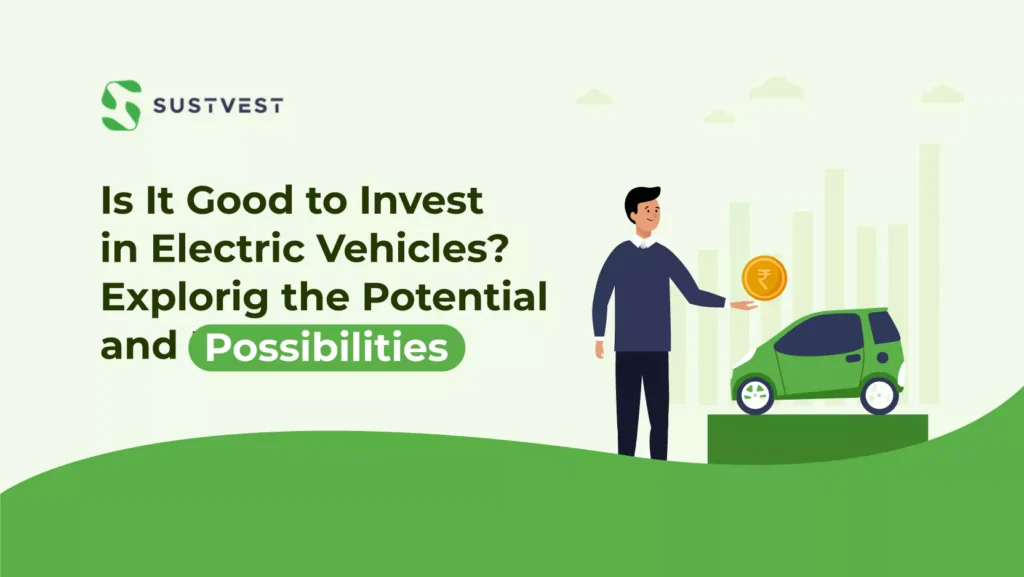
Electric vehicles (EVs) have been making headlines in recent years as more and more people consider them an alternative to traditional gasoline-powered cars. But is it a good idea to invest in an electric vehicle? In this blog post, we’ll dive into the pros and cons of owning an EV and discuss whether it’s a smart move for you.
From lower fuel costs to reducing your carbon footprint, some compelling reasons exist to go electric. However, some challenges are also to consider, such as limited charging infrastructure and higher upfront costs. So, grab a cup of coffee and join us as we explore the world of electric vehicles and help you make an informed decision.
But have you wondered why is investing in this sector a boon and not a bane? Let’s see.
Why is the EV sector in India a good investment opportunity?
Investments in the EV industry are already being attracted due to its significance and anticipated growth. The sector received approximately $6 billion in investments in 2021, and this figure is expected to rise to $20 billion by 2030.
The Automotive Mission Plan (AMP) 2016–26 encompasses the shared objectives of the Indian government and the automotive sector. As per the AMP 2016-26, the industry is projected to contribute over 12% of the country’s GDP, with a current achievement of 7.1%. It also aims to represent at least 40% of the manufacturing sector by the end of 2026. Meeting these targets will lead to significant changes in both the automobile industry and India as a whole.
India’s EV industry is expected to play a crucial role in the future of the automotive sector. As concerns about climate change continue to grow, EVs are poised to become the primary driving force in the industry in the coming years.
EV sector in India a good investment opportunity
Another important factor to consider is that India’s plans for internal lithium-ion battery production could have a significant impact on reducing the costs of EVs. This would not only help decrease dependence on imports but also disrupt import duties. Consequently, it is anticipated that a substantial market for EVs will emerge in India soon.
Furthermore, India’s concerted efforts to promote shared, electric, and connected mobility by 2030 are likely to result in a reduction of one gigatonne of carbon dioxide emissions. This signifies that our country is heading towards a greener future and making progress towards achieving sustainable transportation.
The auto industry in India has witnessed substantial growth and is predicted to sustain its exponential expansion. Concerning market performance, the demand for environmentally friendly products has been prompted by the pandemic, with electric vehicles (EVs) serving as a remarkable solution for reducing pollution levels.
As the popularity of emission-free cars continues to rise, so does the potential for investment in electric vehicles. These vehicles are increasingly favored for their convenience and sustainability. They are also becoming more affordable and efficient, while advancements in battery technology are being made.
But what do you need to know before deciding to invest in electric cars? Let’s take a look.
The Benefits of Investing in Electric Cars
Lower running costs
Owning an electric car comes with numerous benefits, one of which is the cost savings it offers. Compared to gasoline vehicles, electric cars are more energy-efficient and therefore cheaper to operate. Charging an electric car costs significantly less than refuelling a gasoline vehicle.
Additionally, electric cars require less maintenance, leading to lower repair expenses in the long run. As a result, the overall cost of owning an electric car may be lower than that of a gasoline vehicle within a few years. Furthermore, finding affordable electric car insurance is easier when the ownership costs are lower.
Environmental benefits
One of the key benefits of owning an electric car is its positive effect on the environment. Electric cars do not emit any pollutants, unlike gasoline vehicles, thereby aiding in the reduction of air pollution. This aspect holds particular significance in India, where air pollution is a major issue.
By opting for an electric car, you can actively participate in decreasing the carbon footprint and making India a cleaner and more sustainable nation. Additionally, the Indian government has taken steps to promote the use of electric vehicles on Indian roads, which will lead to a substantial decrease in carbon emissions from the transportation sector.
Government subsidies
The Indian government offers several electric vehicle subsidies in India to promote the use of electric cars. This includes a 50% subsidy on the purchase price of electric cars for individual buyers, along with tax breaks and exemptions.
Additionally, the government offers incentives for the development of electric vehicle charging infrastructure, making it easier and more convenient to own an electric car. As per the Union Budget 2021-22, the government allocated ₹800 crore for Phase 2 of FAME (Faster Adoption and Manufacturing of Electric Vehicles in India) scheme1.
This scheme aims to promote the use of electric vehicles in India. It is expected to drive the growth of electric vehicles in the country and make them more accessible to consumers. Moreover, these subsidies could be helpful as you can spend more on electric commercial insurance.
Insurance benefits
Electric cars also come with certain insurance benefits. Since electric cars are less prone to accidents and require less maintenance, insurance premiums are generally lower for electric cars when compared to gasoline vehicles.
Additionally, some insurance companies offer special electric car insurance policies that provide coverage for battery damage, which is not covered under regular car insurance policies. Moreover, electric car insurance policies offer add-on covers such as personal accident cover and third-party liability cover, which provide additional protection to the policyholder.
Reduced dependence on fuel prices
Electric cars run on electricity. Electricity can be generated through renewable sources. This reduces the dependence on fuel, which is a major advantage. If you depend less on fuel, you do not need to worry much about the prices of petrol or diesel. You end up saving a large sum of money in the long run.
But along with benefits, you must remember that EVs are a growing market, and they have some cons too. Let’s see what are those.
Cons of Investing in an Electric Car
Expensive
Electric cars are relatively expensive when compared to traditional cars. The initial cost of an electric car can burn a hole in your pocket.
Short Driving Range
Electric cars have a limited driving range, unlike traditional cars. You may have to stop and charge your car frequently during long trips.
Infrastructure
Electric car charging stations are not as widely available as gasoline stations. Hence, finding a charging station can be quite challenging in certain areas.
Charging Time
Charging an electric car can take a considerable amount of time. This means that you need to plan your trips accordingly to ensure that you have enough charge to reach your destination.
Battery Replacement
Electric car batteries have a limited lifespan and require replacement after a few years. Battery replacement can be expensive and can significantly increase the overall cost of the car.
But how can we decide which is better to buy an electric car or a gas-powered car? Let’s see.
Electric Cars vs Gas-Powered Cars The Ultimate Investment Showdown
Which investment will provide the best return in the long run? Let’s break it down.
Performance
One of the most significant advantages of electric cars is their performance. Electric motors have instant torque, meaning they can go from 0 to 60 mph in a matter of seconds. The acceleration of electric vehicles is also significantly smoother than their gas-powered counterparts. However, one of the biggest drawbacks of electric cars is their range.
While gas-powered cars can travel hundreds of miles before needing to be refuelled, electric cars typically have a range of around 100-200 miles, depending on the model. Although newer models are pushing the boundaries of range capabilities, gas-powered cars still reign supreme in this category.
Cost
Electric cars may have a higher upfront cost, but they oftentimes have lower maintenance costs than gas-powered cars in the long run. This is because electric cars have fewer parts than traditional cars, meaning there are fewer things to break down. In addition, electric cars don’t need oil changes, spark plugs, or other typical maintenance items.
Gas-powered cars, on the other hand, require regular maintenance and oil changes, which can add up over time. However, one of the most significant drawbacks of electric cars is the cost of charging stations. While it is relatively cheap to charge an electric car at home, public charging stations can be expensive, making long road trips difficult and costly.
Environmental Impact
One of the most significant advantages of electric cars is their environmental impact. They emit zero emissions, meaning they don’t contribute to air pollution. This is a significant advantage over gas-powered cars, which emit harmful pollutants into the air.
With the push for more eco-friendly alternatives in transportation, electric cars are becoming a popular choice for those looking to reduce their carbon footprint. However, it’s essential to note that electric cars are only as environmentally friendly as the source of electricity used to charge them.
If the source of electricity is generated from fossil fuels, then the environmental impact is nominal.
FAQ: Is It Good to Invest in Electric Vehicles
Is it worth investing in EV?
An EV costs the equivalent of 40c per litre1 to “fill up” when charged at home, which is easy and convenient. They’re likely to work out cheaper to own than their fossil-fuelled equivalent, thanks to that low-cost charging, and lower maintenance fees.
What is the future scope of electric vehicles in India?
For instance, a recent survey shows that between 2021 and 2022, the number of EVs sold in India jumped by a whopping 210 percent. Likewise, according to the Economic Survey of 2023, the country’s yearly sale of electric vehicles will touch the 10 million threshold by 2030.
Is EV business profitable in India?
The simple answer to the looming question, “Is EV charging business profitable?” is a resounding yes. According to recent market studies, businesses that have incorporated EV chargers have not only seen an uptick in customer footfall but have also benefited from increased dwell time.
Conclusion
In conclusion, buying an electric car in India comes with several benefits, including lower running costs, environmental benefits, government subsidies, electric vehicle insurance benefits, and reduced dependence on foreign oil.
With the government’s push towards electric mobility and the availability of incentives and subsidies, electric cars are becoming increasingly accessible to consumers in India. As the market for electric cars grows, the cost of batteries and other components is expected to decline, making electric cars even more affordable in the coming years.
In addition to the benefits mentioned above, electric cars also offer several other advantages over gasoline vehicles. For example, electric cars are quieter and smoother to drive, providing a more comfortable ride for passengers. Additionally, electric cars offer instant torque, which means they can accelerate quickly and efficiently.
This makes them ideal to be driven in an urban environment. This is because cities commonly have stop-and-go traffic.

Founder of Sustvest
Hardik completed his B.Tech from BITS Pilani. Keeping the current global scenario, the growth of renewable energy in mind, and people looking for investment opportunities in mind he founded SustVest ( formerly, Solar Grid X ) in 2018. This venture led him to achieve the ‘Emerging Fintech Talent of the Year in MENA region ‘ in October 2019.




